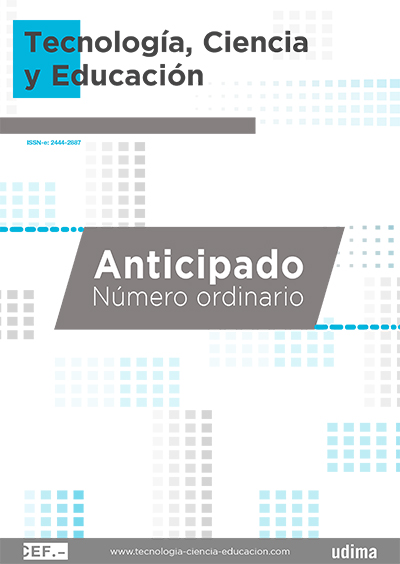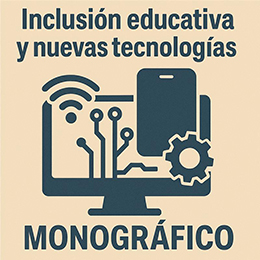El uso de «videojuegos serios» para la prevención y el tratamiento del consumo de sustancias: una cartografía conceptual
DOI:
https://doi.org/10.51302/tce.2025.22325Palabras clave:
videojuego serio, prevención, tratamiento, consumo de sustancias, intervención digital, educación para la salud, gamificaciónResumen
En la era digital actual, los «videojuegos serios» se han convertido en herramientas efectivas para abordar una variedad de condiciones psicológicas y físicas, como el estrés, la ansiedad y los trastornos del estado de ánimo, así como para prevenir y tratar el consumo de sustancias.
Este trabajo presenta un análisis detallado del concepto de «videojuego serio» en la prevención y el tratamiento del consumo de sustancias por medio de la metodología de la cartografía conceptual, a través de sus ocho ejes fundamentales, para proporcionar una visión completa del tema.
Se destaca la integración de teorías de la personalidad en estos videojuegos, como la teoría cognitivo-social, de sensibilización al incentivo y de la autodeterminación, junto con la aplicación de métodos de diseño centrados en el usuario. Estos métodos facilitan la comprensión de las motivaciones, las actitudes y las percepciones de los usuarios (hombres y mujeres), y permiten el desarrollo de juegos que aborden de manera precisa los factores que influyen en el consumo de sustancias, lo que los convierte en una herramienta innovadora en la prevención y el tratamiento de adicciones.
Los «videojuegos serios» propician la reflexión y motivan cambios de comportamiento de una manera entretenida y accesible. Sin embargo, es importante que en su diseño y desarrollo mantengan un enfoque multidisciplinario y una metodología centrada en el usuario para que puedan considerarse como una estrategia efectiva en el campo de la salud mental y la adicción.
Descargas
Citas
Abraham, O., Nixon, G. A. y Seitz, L. L. (2023). Parents´ perceptions of a serious game for educating families on prescription opioid safety: qualitative pilot study of MedSMARxT: adventures in PharmaCity. JMIR Serious Games, 11(1), 1-15. https://doi.org/10.2196/49382
Abroms, L. C., Fishman, M., Vo, H., Chiang, S. C., Somerville, V., Rakhmanov, L., Ruggiero, M. y Greenberg, D. (2019). A motion-activated video game for prevention of substance use disorder relapse in youth: pilot randomized controlled trial. JMIR Serious Games, 7(2), 1-12. https://doi.org/10.2196/11716
Aneni, K., Fernandes, C. S. F., Hoerner, L. A., Szapary, C., Pendergrass Boomer, T. M. y Fiellin, L. E. (2023). A video game intervention to prevent opioid misuse among older adolescents: development and preimplementation study. JMIR Serious Games, 11(1), 1-16. https://doi.org/10.2196/46912
Bezençon, V., Santo, A. de, Holzer, A. y Lanz, B. (2023). Escape addict: a digital escape room for the prevention of addictions and risky behaviors in schools. Computers and Education, 200. https://doi.org/10.1016/j.compedu.2023.104798
Boyle, S. C., LaBrie, J. W., Trager, B. M. y Costine, L. D. (2022). A gamified personalized normative feedback app to reduce drinking among sexual minority women: randomized controlled trial and feasibility study. JMIR Research Protocols, 24(5). https://doi.org/ 10.2196/34853
Carvalho, D. B. F., Domingueti, D. B., Almeida Santos, S. M. de y Dias, D. R. C. (2019). A game to deal with alcohol abuse (Jib): development and game experience evaluation. JMIR Serious Games, 7(4), 1-13. https://doi.org/10.2196/11151
Engelbrecht, H., Laan, L. N. van der, Enschot, R. van y Krahmer, E. (2022). The role of agency and threat immediacy in interactive digital narrative fear appeals for the prevention of excessive alcohol use: randomized controlled trial. JMIR Serious Games, 10(2), 1-14. https://doi.org/10.2196/32218
Flaudias, V., Zerhouni, O., Chakroun-Baggioni, N., Chazeron, I. de, Llorca, P. M. y Brousse, G. (2022). Evaluation of a smartphone application on the reduction of attentional bias toward alcohol among students. Frontiers in Psychology, 13, 1-7. https://doi.org/10.3389/fpsyg.2022.790030
Gómez León, M.ª I. (2024). Eficacia de los videojuegos en la regulación emocional de los estudiantes. Tecnología, Ciencia y Educación, 29, 31-58. https://doi.org/10.51302/tce.2024.21317
Hong, T., Cabrera, J. y Beaudoin, C. E. (2020). The role of enjoyment in a serious game for binge drinking prevention: pretest-posttest quasi-experimental study. Journal of Medical Internet Research, 22(11), 1-12. https://doi.org/10.2196/21652
Hong, T., Cabrera, J. y Beaudoin, C. E. (2023). Disentangling real-world and virtual-world social norms: the persuasive elements and social psychological effects of a serious game. Telematics and Informatics Reports, 9, 1-9. https://doi.org/10.1016/j.teler.2022.100038
Huizinga, J. (2016). Homo Ludens. A Study of the Play-Element in Culture (Vol. 1, 7.ª ed.). Angelico Press.
Kapitány-Fövény, M., Vagdalt, E., Ruttkay, Z., Urbán, R., Richman, M. J. y Demetrovics, Z. (2018). Potential of an interactive drug prevention mobile phone app (Once upon a high): questionnaire study among students. JMIR Serious Games, 20(12). https://doi.org/10.2196/games.9944
LaBrie, J. W., Rutte, J. L. de, Boyle, S. C., Tan, C. N. y Earle, A. M. (2019). Leveraging copresence to increase the effectiveness of gamified personalized normative feedback. Addictive Behaviors, 99. https://doi.org/10.1016/j.addbeh.2019.106085
Lima-Serrano, M., Fernández-León, P., Mercken, L., Martínez-Montilla, J. M. y Vries, H. de. (2021). An animation-versus text-based computer-tailored game intervention to prevent alcohol consumption and binge drinking in adolescents: study protocol. International Journal of Environmental Research and Public Health, 18(19), 1-16. https://doi.org/10.3390/ijerph18199978
Luna-Perejon, F., Malwade, S., Styliadis, C., Civit, J., Cascado-Caballero, D., Konstantinidis, E., Abdul, S. S., Bamidis, P. D., Civit, A. y Li, Y.-C. (Jack). (2019). Evaluation of user satisfaction and usability of a mobile app for smoking cessation. Computer Methods and Programs in Biomedicine, 182. https://doi.org/10.1016/j.cmpb.2019.105042
Martínez-Miranda, J. y Espinosa-Curiel, I. E. (2022). Serious games supporting the prevention and treatment of alcohol and drug consumption in youth: scoping review. JMIR Serious Games, 10(3), 1-23. https://doi.org/10.2196/39086
Nicholas, J., Mills, B., Hansen, S., Bright, S. J., Boyd, H., Brook, L., Watson, J. y Hopper, L. (2022). Developing an alcohol and other drug serious game for adolescents: considerations for improving student engagement. Australian and New Zealand Journal of Public Health, 46(5), 682-688. https://doi.org/10.1111/1753-6405.13287
Nicholas, J., Mills, B., Hansen, S., Bright, S. J., Scott, J., Ridout, I., Watson, J., Boyd, H., Brook, L. y Hopper, L. (2023). Sideffect GamePlan: development of an alcohol and other drug serious game for high school students using a systematic and iterative user-centred game development framework. Computers in Human Behavior, 145, 1-20 https://doi.org/10.1016/j.chb.2023.107774
Ortega-Carbajal, M. F., Hernández-Mosqueda, J. S. y Tobón-Tobón, S. (2015). Análisis documental de la gestión del conocimiento mediante la cartografía conceptual. Ra Ximhai, 11(4), 141-160.
Pan American Health Organization. (2021). The Burden of Drug Use Disorders in the Region of the Americas (2000-2019). https://www.paho.org/en/enlace/burden-drug-use-disorders
Pentz, M. A., Hieftje, K. D., Pendergrass, T. M., Brito, S. A., Liu, M., Arora, T., Tindle, H. A., Krishnan-Sarin, S. y Fiellin, L. E. (2019). A videogame intervention for tobacco product use prevention in adolescents. Addictive Behaviors, 91, 188-92. https://doi.org/10.1016/j.addbeh.2018.11.016
Pereira Henríquez, F. y Alonzo Zúñiga, T. (2017). Hacia una conceptualización de los videojuegos como discursos multimodales electrónicos. Anagramas. Rumbos y Sentidos de la Comunicación, 15(30), 51-64. https://doi.org/10.22395/angr.v15n30a2
Rojas Piedra, T., Reyes Masa, B., Tapia Chamba, A. y Sanchez Ruiz, J. (2020). El consumo de sustancias psicoactivas y su influencia en el desarrollo integral. Journal of Buseiness and Entreprencurial Studies, 4(1), 1-13. https://www.redalyc.org/articulo.oa?id=573667940004
Salvador-Gómez, A., Escrig-Tena, A. B., Beltrán-Martín, I. y García-Juan, B. (2022). El escape room virtual: herramienta docente universitaria para el desarrollo de competencias transversales y para la retención del conocimiento. Tecnología, Ciencia y Educación, 21, 7-48. https://doi.org/10.51302/tce.2022.664
Schilt, T., Ruijter, E. S., Godeschalk, N., Haaster, M. van y Goudriaan, A. E. (2022). The use of smartphone serious gaming apps in the treatment of substance use disorders: observational study on feasibility and acceptability. JMIR Formative Research, 6(9), 1-12. https://doi.org/10.2196/34159
Tobon, S., Eduardo Martínez, J., Valdez Rojo, E. y Quiriz, T. (2018). Prácticas pedagógicas: análisis mediante la cartografía conceptual. Espacios, 39(53).
Vollstädt-Klein, S., Mildner, P., Bumb, J. M., Karl, D., Ueberle, C., Shevchenko, Y., Kiefer, F. y Effelsberg, W. (2020). The training game SALIENCE for the therapy of alcohol use disorder. Health Informatics Journal, 26(1), 499-512. https://doi.org/10.1177/1460458219839612
Weber, A., Shevchenko, Y., Gerhardt, S., Hoffmann, S., Kiefer, F. y Vollstädt-Klein, S. (2023). Effectiveness of reducing craving in alcohol use disorder using a serious game (SALIENCE): randomized controlled trial. JMIR Formative Research, 7(1), 1-17. https://doi.org/10.2196/42194
White, J. S., Salem, M. K., Toussaert, S., Lee Westmaas, J., Raiff, B. R., Crane, D., Warrender, E., Lyles, C., Abroms, L. y Thrul, J. (2023). Developing a game (Inner Dragon) within a leading smartphone app for smoking cessation: design and feasibility evaluation study. JMIR Serious Games, 11. https://doi.org/10.2196/46602
Willmott, T., Russell-Bennett, R., Drennan, J. y Rundle-Thiele, S. (2019). The impact of serious educational gameplay on adolescent binge drinking intentions: a theoretically grounded empirical examination. Health Education and Behavior (HE&B), 46(1), 114-125. https://doi.org/10.1177/1090198118780493
Zhang, M., Heng, S., Song, G., Fung, D. S. S. y Smith, H. E. (2019). Co-designing a mobile gamified attention bias modification intervention for substance use disorders: participatory research study. JMIR mHealth and uHealth, 7(10), 1-15. https://doi.org/10.2196/15871
Descargas
Publicado
Cómo citar
Número
Sección
Licencia
Derechos de autor 2025 Mónica Urrutia-Reyes, Ana Marcela Herrera-Navarro

Esta obra está bajo una licencia internacional Creative Commons Atribución-NoComercial-SinDerivadas 4.0.


























